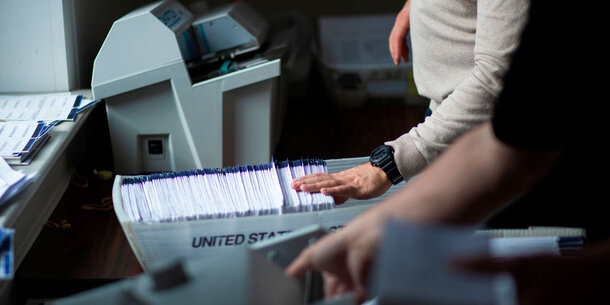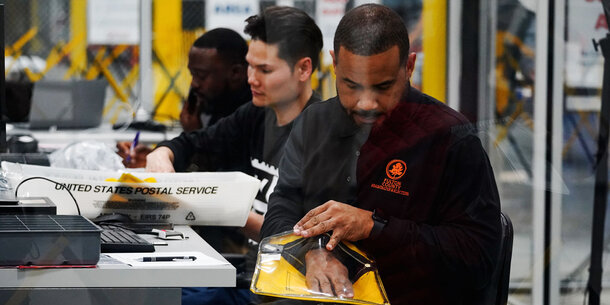This piece was originally published in the Los Angeles Times.
For the last three weeks, the Jan. 6 hearings have brought back the sights, sounds and horror of a mob infiltrating the U.S. Capitol in broad daylight, bent on overturning the will of millions of American voters.
Of course, this mass violence is just one of the tactics used by those trying to undermine our democracy. Another tool in play is a legal notion from the most radical fringes of American jurisprudence, a thoroughly debunked idea that anti-democratic forces have been touting heavily since the 2020 elections: the so-called independent state legislature theory.
For the last several years, a small group of conservative legal activists has been trying transform this radical reading of the Constitution into the law of the land.
The theory contorts the Constitution’s elections and electors clauses, which give states the authority to regulate federal elections — to draw the boundaries for congressional districts and to adopt policies like mail voting and early voting, for example — while at the same time empowering Congress to enact federal election laws and override state policy.
That’s how these clauses have been understood for the past 200 years. But proponents of the far-fetched “independent state legislature theory” are now contending that these clauses grant state legislatures near absolute power over the laws governing elections for federal office — leaving state courts, state constitutions, state governors and other state entities powerless to stop even the most extreme gerrymanders and voter suppression laws that a state legislature could devise. It’s just as nutty as it sounds.
This isn’t a theoretical legal dispute: This theory, which activists are pressing the Supreme Court to consider this fall, could turn our democracy upside down. In its most extreme forms, it would throw election administration into chaos by nullifying hundreds of election laws that voters have adopted through referenda, that are written into state constitutions and that have been promulgated through administrative regulations, governing such processes as voter registration, mail voting and the guarantee of a secret ballot.
And the theory would remove many checks and balances on state legislators, unleashing the very bodies that have been enacting laws that make it harder to vote — particularly for Americans of color — and easier to interfere in election outcomes. Under this theory, the only remaining arbiter as to the lawfulness of state legislatures’ handiwork? The Supreme Court — which has been steadily dismantling what little remains of federal law protections for our elections.
The independent state legislature theory isn’t just a terrible idea, though. It’s also flat wrong as a matter of constitutional interpretation.
The clear intent of the founders who drafted the Constitution, along with hundreds of years of practice and legal precedent, never contemplated handing this kind of unbridled power to state legislatures. The independent state legislature theory has no legal or historic validity — it is a fever dream of partisan activists who are desperate to find some pretext to empower certain state legislatures for their political advantage.
The founders drafted the Constitution to corral self-dealing and self-interested state politicians who were behaving badly under the relatively weak Articles of Confederation. James Madison explained that this federal power was necessary because “[i]t was impossible to foresee all the abuses” of power that states might pursue if given “uncontrouled right” over federal elections. Madison warned that state legislators would “mould their regulations as to favor the candidates they wished to succeed.” He and other founders worried that, if unchecked, states would embrace voter suppression measures like putting polling places in inconvenient locations and adopt vote dilution tactics like gerrymandering.
Just as in the founding era, most state constitutions today regulate federal elections (for example, by directing the process for congressional redistricting), and most state legislatures share their elections power with other state actors. It should come as no surprise that the Supreme Court throughout American history has expressly rejected the independent state legislature theory, most recently in a 2015 case approving of a redistricting commission created by voter referendum in Arizona.
Nevertheless, before the 2020 election, President Trump and his attorneys tried to use this theory in his legal efforts to strike down the policies that secretaries of state, other state election bodies and state courts implemented in 2020 to ensure that voters could cast their ballots safely during the pandemic. Trump argued that these entities couldn’t regulate elections because they weren’t part of the "legislature,” even though they have been integral to state lawmaking processes since the founding.
Those cases bounced around the Supreme Court through petitions for emergency relief, and while the court didn’t take any of them up, four conservative justices wrote separately to indicate their openness to the claim. After the election, Trump and his allies tried to use the theory as political cover for the plot to convince state legislators to select their own slates of presidential electors and overturn the election results.
Gerrymanderers from North Carolina are currently trying to push the theory in a case the Supreme Court might take up for argument this fall. And other cases are lurking as potential carriers for this poisonous notion. The independent state legislature theory has no legitimate basis in American law. This perverse reading of the Constitution cannot be allowed to undermine American elections.



